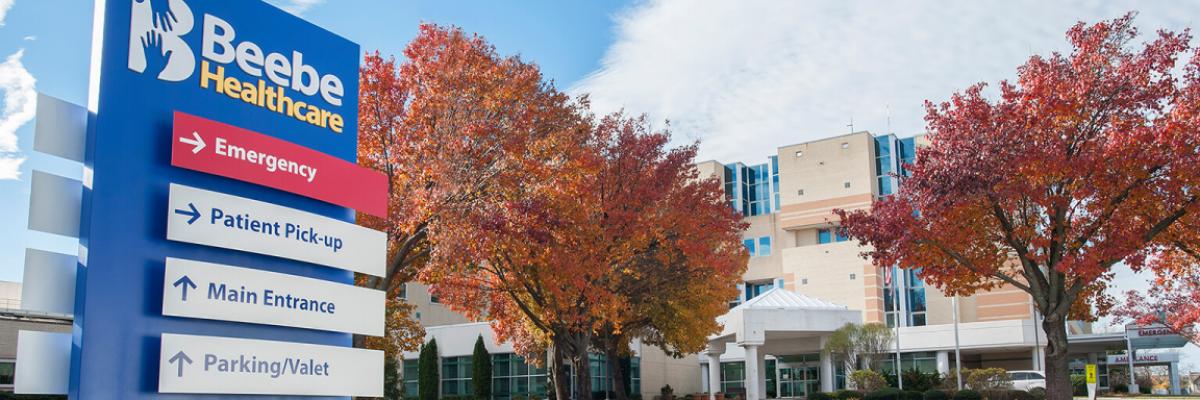Heat-related Illness is a Real Danger
Prevent a Trip to the Emergency Department
Beebe Healthcare Emergency Department has seen its share of heat-related illness this summer. Emergency doctors are urging community members to be aware of the signs of heatstroke and heat-related illness and know how to prevent a trip to the emergency department.
“Heat-related illness is a common reason for older adults to end up in the emergency department,” said Beebe Emergency Services Director Kevin Bristowe, MD, FACEP. Older adults and those with chronic medical issues are more likely to be affected by high temperatures.
“Some medications, such as antihypertensive prescriptions, can increase the chance of heat-related illness. Older adults should limit heat exposure, keep the air conditioning on and operational, and make sure to drink enough water,” Dr. Bristowe said. “Family members and friends should check up on older adults to make sure they are cool enough and drinking enough fluids.”
In addition, children are also at an increased risk for heatstroke, commonly known as hyperthermia, during the summer months. Heatstroke is the leading cause of non-crash, vehicle-related deaths for children. It occurs when the body is not able to cool itself quickly enough, allowing body temperature to rise quickly to dangerous levels. Young children are more at risk because their bodies heat up three to five times faster than an adult’s body.
When does body temperature start to cause damage?
- At 104 degrees, the major organs start to shut down
- At 107 degrees, a child can die
A car left in the sun can heat up by 19 degrees in just 10 minutes. Opening the window does not help reduce the temperature. Symptoms of heat-related illness and heatstroke include:
- Dry, flushed skin
- Dizziness, disorientation, agitation, confusion or sluggishness
- Vomiting
- Seizures
- Rapid heartbeat
- Loss of consciousness
- Organ failure
While news stories often circulate during summer months about children who die after being forgotten in a car, children have also died while playing unattended in cars. Since 1998 more than 600 children have died in the U.S. from heatstroke. Of those, 53 percent were forgotten in a car; 29 percent were children playing unattended; and 17 percent were children intentionally left in the car.
Programs such as Safe Kids Worldwide have information available for organizations to help educate parents and caregivers about the dangers of heatstroke. For information, including printables to hand out, go to Safe Kids:Heatsroke.
“It is easy to become distracted, but when you are distracted around cars, it can endanger not only your life, but the life of your child,” Dr. Bristowe said. “Studies have shown that heatstroke tragedies often happen when the daily routine is changed – dad takes the child to school instead of mom and forgets. These types of tragedies can be prevented. Write yourself a note and put it on your steering wheel reminding you about the child. Set a phone alarm or reminder. Check your car before locking up and walking away. Have a caregiver call if the child isn’t at school when expected.”
Safe Kids urges community members to prevent tragedies by remembering to ACT:
- A – Avoid heatstroke-related injury and death by never leaving a child alone in a car, not even for one minute. Keep your car locked when you are not in it to prevent a child from playing inside without supervision.
- C – Create reminders by putting something in the back of the car next to your child, such as a briefcase or your cell phone, to remind you that the child is in the car. This is especially important if you are not following your normal routine.
- T – Take action. If you see a child alone in a car, call 911 immediately. Emergency personnel are trained to respond to these situations. One call could save a life.
Beebe Healthcare is a not-for-profit community healthcare system with a charitable mission to encourage healthy living, prevent illness, and restore optimal health for the people residing, working, or visiting in the communities we serve. It offers services throughout Southern Delaware for residents and visitors, including a 210-licensed-bed hospital, a cancer center, and outpatient facilities providing walk-in care, lab, imaging, and physical rehab services. For more information, please visit us online at Beebe Healthcare.
